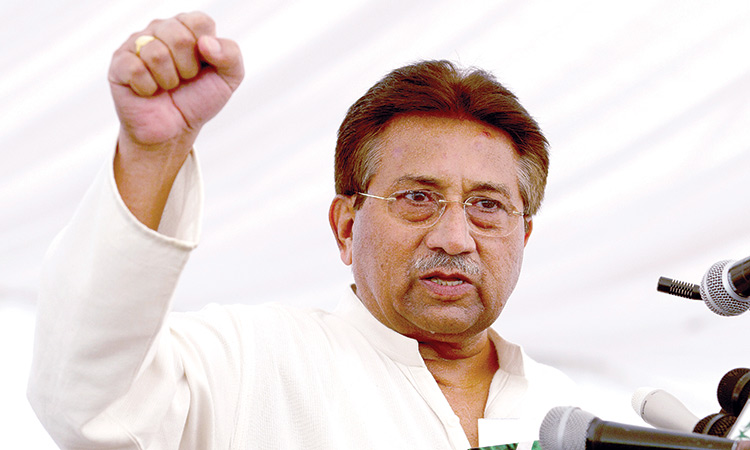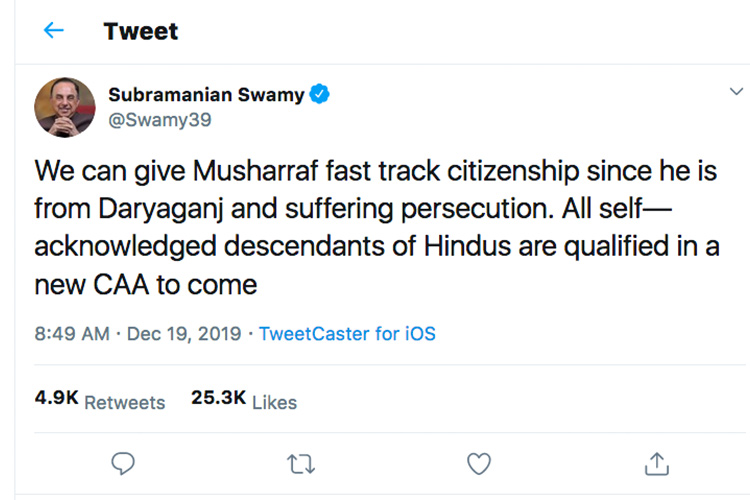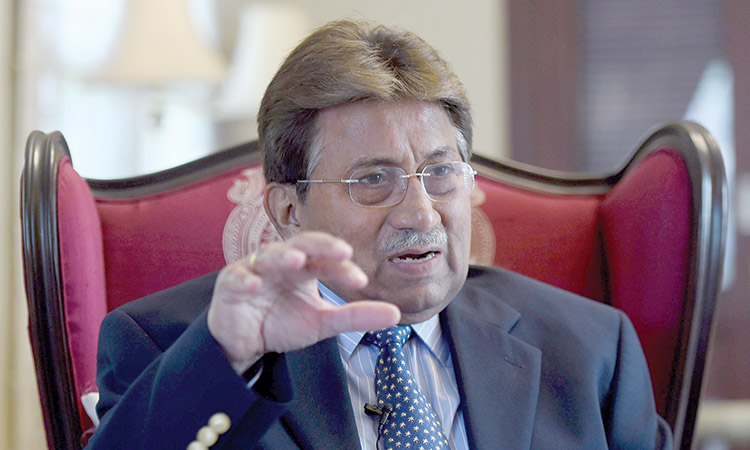Musharraf’s emergency move was against constitution: FIA

Supporters of Pervez Musharraf protest against court’s decision in Lahore on Saturday. Associated Press
An inquiry conducted by the Federal Investigation Agency (FIA) on Nov 3, 2007 state of emergency imposed by Pervez Musharraf as the chief of the army staff, which led to the institution of high treason case against him, had concluded that “irrefutable proof and concrete documentary evidence” is available that the former dictator acted unconstitutionally to subvert the Constitution and dismiss the judges in order to prolong his one-man rule unlawfully.
The report showed that the FIA team probing the matter had recorded statement of 13 witnesses including the then attorney general, secretary cabinet, secretary to the president, secretary to the prime minister, law secretary etc. but none confirmed Musharraf’s claim that he had discussed the unconstitutional step with many including the then cabinet.
The then governor Punjab and Lt Gen (R) Khalid Maqbool also informed the FIA Inquiry Team that Musharraf’s claim in the Proclamation Constitutional Order (PCO) regarding consultation with prime ministers, governor etc was incorrect.
The then attorney general Justice (R) Malik Muhammad Qayyum categorically said he had not forwarded any written advice, input or summary to Musharraf regarding proclamation of emergency in the country. He instead said Musharraf neither discussed the Proclamation of Emergency issue with him nor sought any advice.
Qayyum, according to the report, said he had no prior knowledge of the Nov 3 action, adding, “It was widely known that Musharraf was getting advice on Proclamation of Emergency from Sharifuddin Pirzada, Senior Advisor to Prime Minister on Law”.
Regarding Defence Ministry and General Headquarters (GHQ), the report said, “The Enquiry Team made a number of attempts to obtain summary, notes and proposal etc. concerning Proclamation of Emergency issued by Musharraf on 3rd November, 2007 as the army chief. However, despite the appointment of Focal Officer, Anzar Rizvi by Ministry of Defence no such document or relevant record was provided or shown to the enquiry team.”
The then principal secretary law Justice (R) Mian Muhammad Ajmal told the FIA team that he had no knowledge of any summary regarding Proclamation of 3rd November, 2007 nor his office had issued the Proclamation. However, once the Proclamation was issued, the Prime Minister Secretariat asked him to sign a notification of seizure of office of judges of the Supreme Court.
Ajmal said Musharraf never sought his input but added, “It was widely known that Musharraf was consulting Qayyum, Sharifuddin Pirzada, and Ahmad Raza Kasuri.”
The then secretary cabinet Syed Masud Alam Rizvi said during his tenure, the then prime minister Shaukat Aziz forwarded no advice regarding Proclamation of Emergency to the president.
He categorically stated that 3rd November 2007 was signed by Musharraf as the army chief.
“The Proclamation came to his office from the Presidency in the evening and he endorsed it to be published as a Notification from the Printing Corporation of Pakistan for dissemination to all governors, federal secretaries etc.”
Rizvi added that as far his knowledge was concerned, prior to the proclamation the issues raised in the proclamation were not discussed in the federal cabinet nor was a summary forwarded by the prime minister to the president.
He, however, could not clarify why he notified the Proclamation of 3rd November, 2007 signed by Musharraf without approval of the prime Minister, who was the executive head of the government.
The detailed verdict in the high treason case against former military ruler retired Gen Pervez Musharraf released on Thursday found the former president guilty of treason and handed him a death sentence.
“We direct the law enforcement agencies to strive their level best to apprehend the fugitive/convict and to ensure that the punishment is inflicted as per law and if found dead, his corpse be dragged to the D-Chowk, Islamabad, be hanged for 3 days,” Peshawar High Court Chief Justice Waqar Ahmed Seth, who wrote the judgment, wrote.
other key points were that verdict was split 2-1. It said that military personnel who ‘guarded, abetted’ Musharraf should be held accountable.







